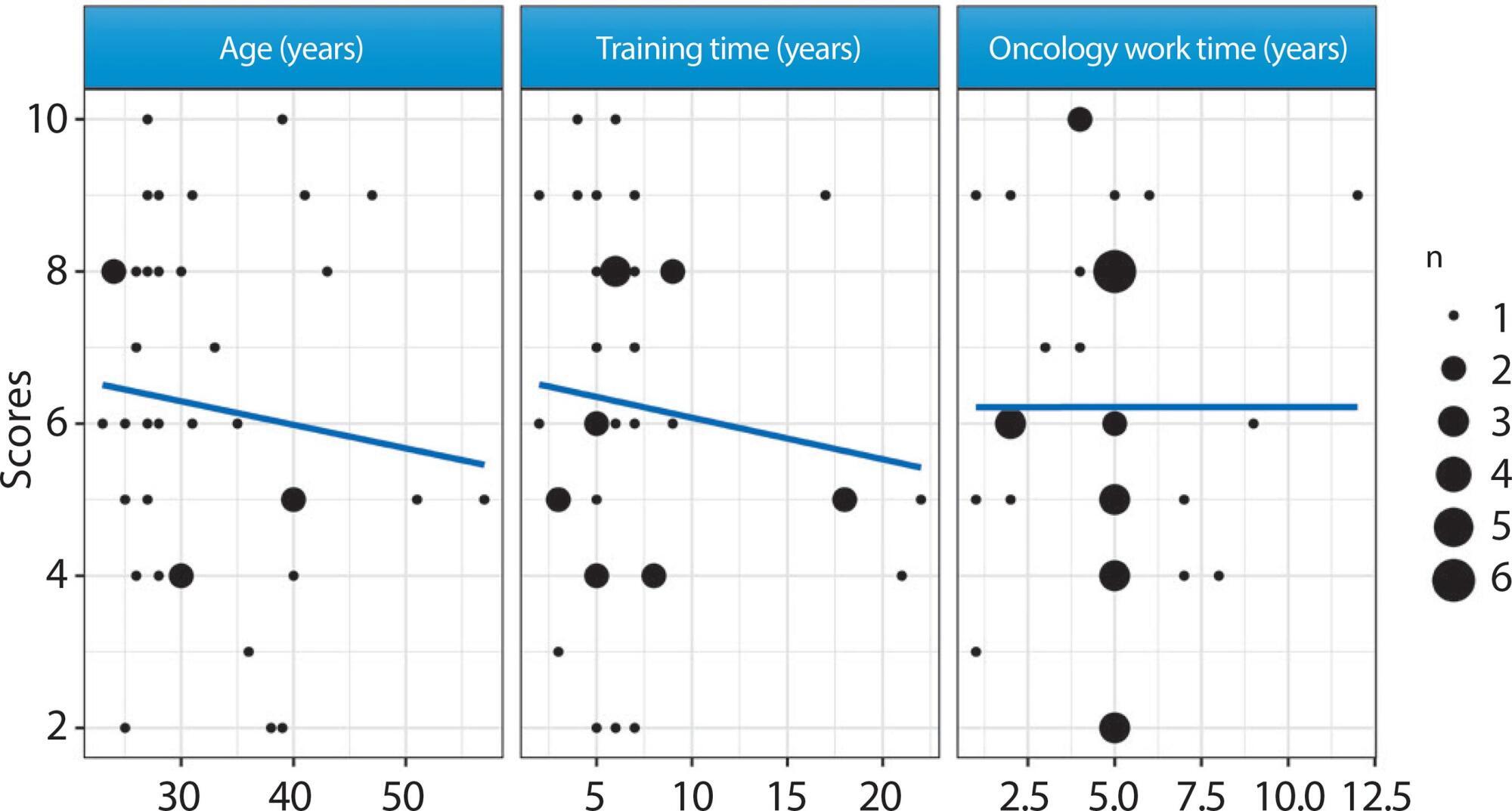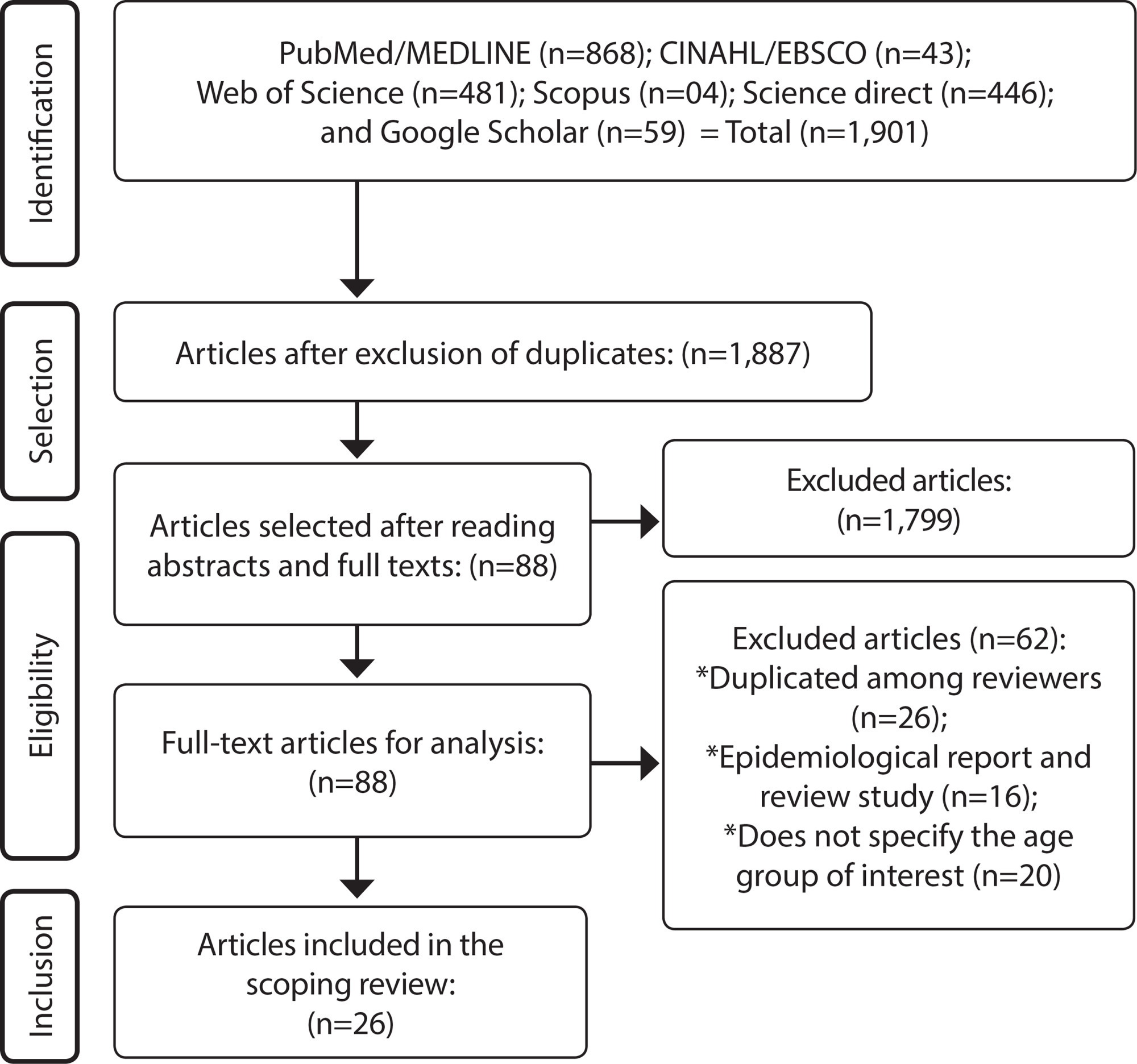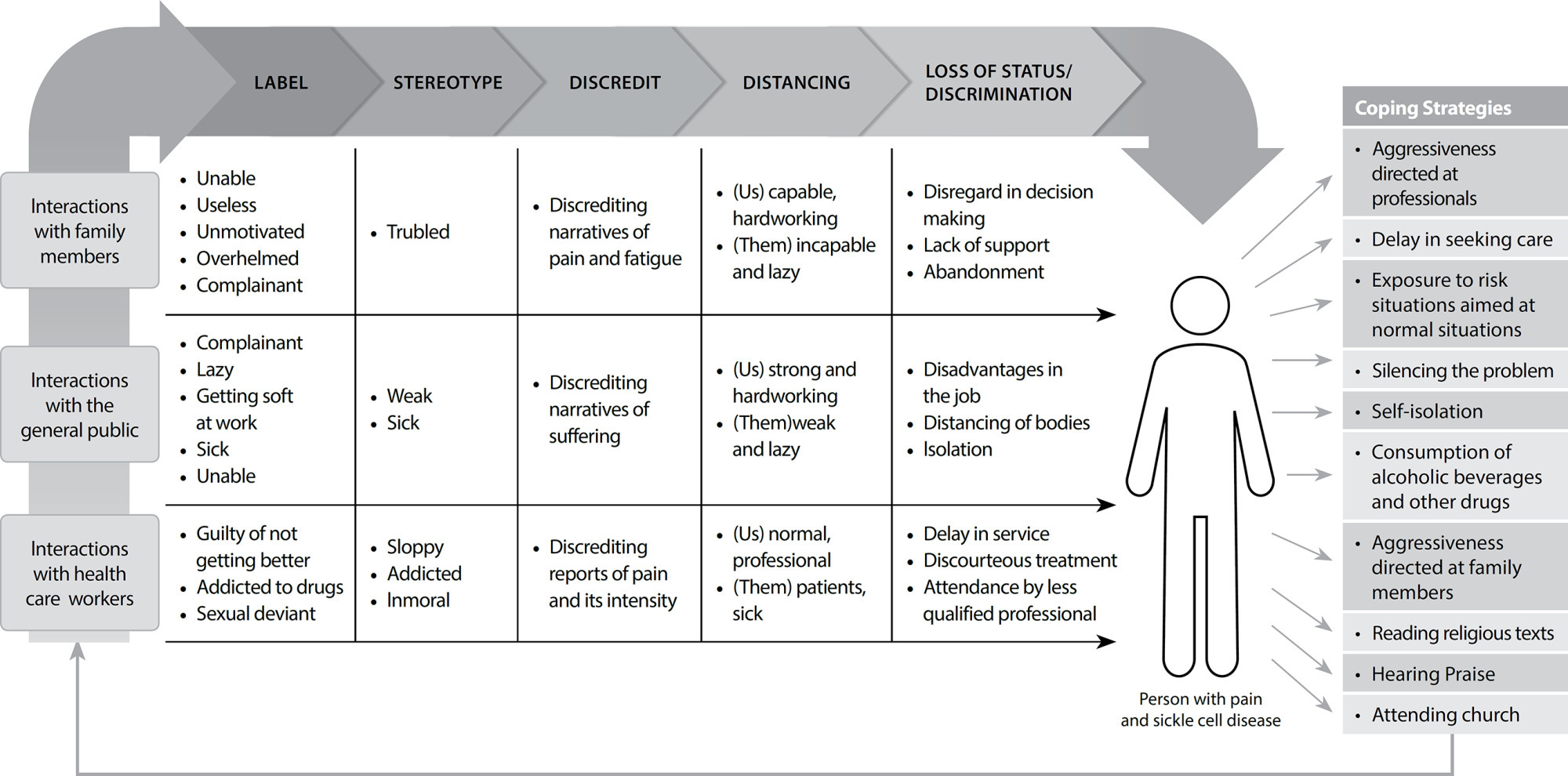-
ORIGINAL ARTICLE09-04-2023
Content validity evidence of the Brazilian version of the Cognitive Symptom Checklist-Work-21
Revista Brasileira de Enfermagem. 2023;76(4):e20220453
Abstract
ORIGINAL ARTICLEContent validity evidence of the Brazilian version of the Cognitive Symptom Checklist-Work-21
Revista Brasileira de Enfermagem. 2023;76(4):e20220453
DOI 10.1590/0034-7167-2022-0453
Views0See moreABSTRACT
Objective:
to cross-culturally adapt and assess the content validity evidence of the Cognitive Symptom Checklist-Work-21 for the Brazilian context.
Method:
a psychometric study of cross-cultural adaptation, covering the stages of translation, reconciliation, back-translation, intercultural equivalence assessment and content validity evidence analysis, considering Content Validity Ratio parameters in breast cancer survivors.
Results:
the translations were equivalent to the original version. Colloquial expressions were modified, tense, verbal adjusted, and two items containing multiple commands were separated. The final version now contains 22 items, presenting semantic, conceptual, idiomatic and experimental equivalences. The pre-test indicated good understanding and ease in the response process.
Conclusion:
the final version was defined as “Lista de verificação de sintomas cognitivos relacionados ao trabalho – 22 itens”, showing good linguistic equivalence and strong evidence of content validity in the Brazilian context.

-
ORIGINAL ARTICLE09-04-2023
Impact of an educational intervention on standard precautions during the COVID-19 pandemic
Revista Brasileira de Enfermagem. 2023;76(4):e20220750
Abstract
ORIGINAL ARTICLEImpact of an educational intervention on standard precautions during the COVID-19 pandemic
Revista Brasileira de Enfermagem. 2023;76(4):e20220750
DOI 10.1590/0034-7167-2022-0750
Views0See moreABSTRACT
Objective:
To evaluate the impact of an educational intervention on the knowledge of nursing professionals regarding standard precautions.
Methods:
This is an almost experimental study conducted with 100 nursing professionals. Data collection was performed using a sociodemographic characterization instrument and the Standard Precautions Knowledge Questionnaire. The educational intervention was based on five moments, where the approach to questions with less than 70% accuracy was intensified.
Results:
There was a significant difference between the scores of healthcare professionals before (16.20 ± 1.51) and after (16.90 ± 1.31) the educational intervention (W=3.336; p < 0.05). Regarding knowledge about hand hygiene after glove use, an increase in knowledge from 83% to 93% was obtained.
Conclusions:
A positive effect on the professionals’ knowledge was recorded, demonstrating advances regarding the strengthening of already acquired knowledge and the understanding of new knowledge.

-
EDITORIAL09-04-2023
La cronicidad en el siglo XXI: frente a los desafíos de una sociedad cambiante
Revista Brasileira de Enfermagem. 2023;76(4):e760401
Abstract
EDITORIALLa cronicidad en el siglo XXI: frente a los desafíos de una sociedad cambiante
Revista Brasileira de Enfermagem. 2023;76(4):e760401
DOI 10.1590/0034-7167.2023760401es
Views0Actualmente, existe un aumento de las enfermedades no transmisibles (ENT), el envejecimiento de la población y los cambios en el estilo de vida, lo que corrobora el aumento de la cronicidad, uno de los mayores desafíos que enfrenta la sociedad contemporánea. En este editorial examinaremos la cronicidad en el siglo XXI y la necesidad de […]See more -
EDITORIAL09-04-2023
Chronicity in the 21st century: facing the challenges of a changing society
Revista Brasileira de Enfermagem. 2023;76(4):e760401
Abstract
EDITORIALChronicity in the 21st century: facing the challenges of a changing society
Revista Brasileira de Enfermagem. 2023;76(4):e760401
DOI 10.1590/0034-7167.2023760401
Views0Currently, there is an increase in non-communicable diseases (NCDs), population aging and changes in lifestyle, which corroborates the increase in chronicity, one of the greatest challenges faced by contemporary society. In this editorial, we will examine chronicity in the 21st century and the need to address this problem in a comprehensive and sustainable way.In recent […]See more -
ORIGINAL ARTICLE08-21-2023
Percepciones, maltrato y religión como predictores del impacto psicoemocional en enfermeros durante la pandemia COVID-19
Revista Brasileira de Enfermagem. 2023;76(3):e20220768
Abstract
ORIGINAL ARTICLEPercepciones, maltrato y religión como predictores del impacto psicoemocional en enfermeros durante la pandemia COVID-19
Revista Brasileira de Enfermagem. 2023;76(3):e20220768
DOI 10.1590/0034-7167-2022-0768es
Views0See moreRESUMEN
Objetivos:
analizar la relación entre percepciones, maltrato y religión con el impacto psicoemocional en enfermeros durante la pandemia por covid-19.
Métodos:
estudio transversal descriptivo-analítico. Fue realizado entre los años 2020 y 2021; se encuestó a 319 enfermeros asistenciales de Perú mediante DASS-21; se evaluaron asociaciones mediante Rho de Spearman y regresión múltiple.
Resultados:
el 18,5 % presentó algún grado de estrés; el 50,2 %, ansiedad y el 29,1 %, depresión. La experiencia de maltrato, la autopercepción de la salud mental y la religión fueron predictores de estrés, ansiedad y depresión. El tiempo de experiencia laboral predice el estrés y ansiedad. Además, la autopercepción de la información y el género fueron predictores de la depresión.
Conclusiones:
los enfermeros peruanos presentaron altos niveles de estrés, ansiedad y depresión; y este impacto psicoemocional estuvo asociado a las percepciones, experiencias de maltrato y la religión.
-
ORIGINAL ARTICLE08-21-2023
Effectiveness of educational intervention among seropositive women about knowledge about HIV sexual transmission
Revista Brasileira de Enfermagem. 2023;76(3):e20220371
Abstract
ORIGINAL ARTICLEEffectiveness of educational intervention among seropositive women about knowledge about HIV sexual transmission
Revista Brasileira de Enfermagem. 2023;76(3):e20220371
DOI 10.1590/0034-7167-2022-0371
Views0See moreABSTRACT
Objectives:
to assess the effectiveness of a group and telephone educational intervention with seropositive women about knowledge about HIV sexual transmission prevention.
Methods:
a quasi-experimental before-and-after study, carried out with 151 women living with HIV in a Specialized Care Service in a Brazilian capital. The educational intervention was carried out in three moments, with the assessment being carried out before the first and after the last moment.
Results:
97.4% of study participants were cisgender women aged between 18 and 58 years; 55.6% considered themselves brown; and 32.5% of interviewees had elementary school. Regarding knowledge about HIV sexual transmission, in 78.5% of items, there was an association (p<0.005) with increased participants’ knowledge after receiving the intervention.
Conclusions:
the educational intervention helped to increase the knowledge of women living with HIV about the sexual transmission of the infection.

-
ORIGINAL ARTICLE08-21-2023
Perceptions, maltreatment and religion as predictors of the psycho-emotional impact on nurses during the COVID-19 pandemic
Revista Brasileira de Enfermagem. 2023;76(3):e20220768
Abstract
ORIGINAL ARTICLEPerceptions, maltreatment and religion as predictors of the psycho-emotional impact on nurses during the COVID-19 pandemic
Revista Brasileira de Enfermagem. 2023;76(3):e20220768
DOI 10.1590/0034-7167-2022-0768
Views0See moreABSTRACT
Objectives:
to analyze the relationship between perceptions, abuse and religion with the psycho-emotional impact on nurses during the COVID-19 pandemic.
Methods:
descriptive-analytical cross-sectional study. It took place between 2020 and 2021 and a total of 319 clinical nurses in Peru were interviewed using the DASS-21. Associations were assessed using Spearman’s Rho and multiple regression.
Results:
18.5% had some degree of stress; 50.2%, anxiety and 29.1%, depression. Experience of abuse, self-perception of mental health and religion were predictors of stress, anxiety and depression. The length of work experience predicts stress and anxiety. In addition, self-perception of information and gender were predictors of depression.
Conclusions:
peruvian nurses have high levels of stress, anxiety and depression, and this psycho-emotional impact was associated with perceptions, experiences of abuse and religion.
-
ORIGINAL ARTICLE02-10-2020
Nursing team knowledge on care for patients with fungating wounds
Revista Brasileira de Enfermagem. 2020;73(1):e20170738
Abstract
ORIGINAL ARTICLENursing team knowledge on care for patients with fungating wounds
Revista Brasileira de Enfermagem. 2020;73(1):e20170738
DOI 10.1590/0034-7167-2017-0738
Views0See moreABSTRACT
Objective:
to evaluate the nursing team knowledge of a cancer hospital on care for patients with Malignant Fungating Wounds (MFW) and to analyze associated sociodemographic and educational factors.
Method:
an observational and cross-sectional study, conducted between September and October 2015, after approval by the Research Ethics Committee. A questionnaire was applied containing sociodemographic, educational and related components to the accomplishment of dressings, dressings choice and orientation. Data were analyzed by using Chi-square, Fisher’s exact test, Student’s t-Test and Pearson’s correlation.
Results:
37 professionals participated in the study, most of whom were technicians (56.8%), women (91.9%) and with a mean age of 32 years. The professionals presented 56.5% of correct answers. There were no statistically significant associations between sociodemographic/educational variables and number of correct answers.
Conclusion:
there was a lack of important knowledge about care for patients with MFW, which should guide strategies for the oncology staff training.

-
REVIEW01-29-2021
Epidemiological profile of children and adolescents with COVID-19: a scoping review
Revista Brasileira de Enfermagem. 2021;74:e20200624
Abstract
REVIEWEpidemiological profile of children and adolescents with COVID-19: a scoping review
Revista Brasileira de Enfermagem. 2021;74:e20200624
DOI 10.1590/0034-7167-2020-0624
Views0See moreABSTRACT
Objective:
to map the epidemiological profile of children and adolescents with COVID-19 in the world literature.
Methods:
a scoping review systematized by the Joanna Briggs Institute protocol in the PubMed/MEDLINE, CINAHL, Web of Science, Scopus, Science direct and Google Scholar databases. Articles with children and/or adolescents with laboratory diagnosis of COVID-19 were used.
Results:
thirty-two articles were included in the review. Most children and adolescents were male, with contamination by family transmission. The most frequent clinical manifestations were fever, cough and diarrhea. Ten studies cited pre-existing condition/disease, and hospital length ranged from one to twenty days. Three deaths were reported and no study presented race/color, education and socioeconomic conditions.
Conclusion:
it was possible to screen the epidemiological profile with information about age group, sex, probable contamination of the disease, clinical manifestations, presence of pre-existing disease/condition, hospitalization and deaths among children and adolescents with COVID-19.

-
ORIGINAL ARTICLE09-24-2022
Nurses’ performance in palliative care: spiritual care in the light of Theory of Human Caring
Revista Brasileira de Enfermagem. 2022;75(1):e20210029
Abstract
ORIGINAL ARTICLENurses’ performance in palliative care: spiritual care in the light of Theory of Human Caring
Revista Brasileira de Enfermagem. 2022;75(1):e20210029
DOI 10.1590/0034-7167-2021-0029
Views1See moreABSTRACT
Objectives:
to analyze nurses’ role in assisting patients in palliative care, with emphasis on the spiritual dimension, in the light of Theory of Human Caring.
Methods:
this is an exploratory, qualitative study, carried out in a hospital in João Pessoa, Paraíba, between August and December 2019, with 10 nurses. For data collection, semi-structured interviews were used. For analysis, we opted for content analysis.
Results:
the spiritual dimension of care is contemplated by several religious and spiritual practices. These are respected and encouraged by nurses, although there is difficulty in providing care for the spiritual dimension.
Final Considerations:
nurses have attitudes consistent with Jean Watson’s Theory and apply the Caritas Process elements during assistance to patients’ spiritual dimension in palliative care.
-
ORIGINAL ARTICLE10-21-2019
Mental health in primary health care: health-disease according to health professionals
Revista Brasileira de Enfermagem. 2019;72(6):1609-1617
Abstract
ORIGINAL ARTICLEMental health in primary health care: health-disease according to health professionals
Revista Brasileira de Enfermagem. 2019;72(6):1609-1617
DOI 10.1590/0034-7167-2018-0743
Views0See moreABSTRACT
Objective:
to analyze perceptions of the Family Health Strategy (FHS) professional team about mental health-disorder and to identify health actions developed by the team for people with mental disorders.
Method:
a qualitative study of a Marxist theoretical framework and a dialectical method. 99 FHS middle and higher level professionals from São Paulo participated. Semi-structured interviews were conducted. Data were submitted to ALCESTE software and Thematic Content Analysis.
Results:
there were three empirical categories: Training in Mental Health; Perception of the FHS professional about mental health-disorder; and Health actions developed by the FHS team with people with mental disorders. Actions that converge and diverge from the psychosocial care model were identified.
Final considerations:
there is an effort from professionals to work according to the psychosocial care model, but it is necessary to invest in the Permanent Education in Health of these professionals to overcome barriers and foster successful territorial actions.
-
ORIGINAL ARTICLE06-01-2020
Factors associated with depressive symptoms in older adults in context of social vulnerability
Revista Brasileira de Enfermagem. 2020;73:e20190107
Abstract
ORIGINAL ARTICLEFactors associated with depressive symptoms in older adults in context of social vulnerability
Revista Brasileira de Enfermagem. 2020;73:e20190107
DOI 10.1590/0034-7167-2019-0107
Views0See moreABSTRACT
Objective:
To identify factors associated with depressive symptoms in the elderly inserted in a context of high social vulnerability.
Methods:
A cross-sectional study was carried out with 302 elderly people enrolled in Primary Care. We used a sociodemographic questionnaire, Geriatric Depression Scale, Mini Nutritional Assessment, Shor-form-6D Quality of Life Questionnaire and Medical Outcome Study Scale. For data analysis, a logistic regression was performed considering two groups, with and without depressive symptoms.
Results:
A good perception of the quality of life (OR: 0.21) and receiving emotional support (OR: 0.98) were presented as protective factors for depression, have risks of malnutrition (OR: 4.87), belong to the female sex OR: 1.88) and living alone (OR: 2.34), indicated a predictor factor for depression.
Conclusion:
Quality of life and social support were identified as protective factors for depressive symptoms while being at risk of malnutrition, living alone, reporting pain and being female are predictors.
-
ORIGINAL ARTICLE03-24-2021
Costs of healthcare-associated infections in an Intensive Care Unit
Revista Brasileira de Enfermagem. 2021;74(1):e20200275
Abstract
ORIGINAL ARTICLECosts of healthcare-associated infections in an Intensive Care Unit
Revista Brasileira de Enfermagem. 2021;74(1):e20200275
DOI 10.1590/0034-7167-2020-0275
Views0See moreABSTRACT
Objectives:
to evaluate hospitalization costs of patients with and without Healthcare-Associated Infections an Intensive Care Unit.
Methods:
a retrospective case-control study. Data collection was retrieved from the medical records of Intensive Care Unit of a medium-sized public hospital in Goiás-Brazil. For each case, two controls were selected. Data on socioeconomic, clinical, and hospital costs were collected. To verify associations between variables, Odds Ratio and linear regression were calculated.
Results:
a total of 21 patients diagnosed with Healthcare-Associated Infections and 42 controls were evaluated. The hospitalization cost for patients with infection was four times higher than for non-infection patients (p-value<0.001). There was an association between infection and higher mortality (p-value <0.001), longer hospital-stay (p-value =0.021), and higher hospital costs (p-value =0.007).
Conclusions:
hospitalization costs of diagnosed Healthcare-Associated Infections patients are high compared to those who do not have this diagnosis.

-
ORIGINAL ARTICLE05-21-2021
Music in the relief of stress and distress in cancer patients
Revista Brasileira de Enfermagem. 2021;74(2):e20190838
Abstract
ORIGINAL ARTICLEMusic in the relief of stress and distress in cancer patients
Revista Brasileira de Enfermagem. 2021;74(2):e20190838
DOI 10.1590/0034-7167-2019-0838
Views0See moreABSTRACT
Objectives:
to evaluate the effects of music on the physiological stress and distress of cancer patients being treated in a hospital.
Methods:
quasi-experimental study carried out with cancer patients hospitalized in the nursing wards of a public hospital. There was a single 15-minute intervention using music. It was individual, and headphones were used for patients to listen to three songs chosen by each one. The levels of stress and distress were measured before and after the intervention, using music to analyze the cortisol in the saliva and the answers to the distress thermometer. The significance level of the statistical analysis was 5%, using the non-parametric Wilcoxon test.
Results:
the mean age of the 26 patients was 56 years old. Most were female, white, and had breast cancer. After intervention, there were statistically significant diminutions in both stress and distress — p < 0.001.
Conclusions:
the use of music diminishes the stress and the distress of cancer patients.

Search
Search in:
Nuvem de Tags
Aged (144) Atenção Primária à Saúde (239) COVID-19 (104) Cuidados de Enfermagem (269) Educação em Enfermagem (151) Educação em Saúde (139) Enfermagem (930) Estudos de Validação (131) Health Education (144) Idoso (208) Mental Health (149) Nursing (987) Nursing Care (306) Patient Safety (151) Primary Health Care (284) Qualidade de Vida (104) Quality of Life (106) Saúde Mental (145) Segurança do Paciente (150) Validation Studies (108)





